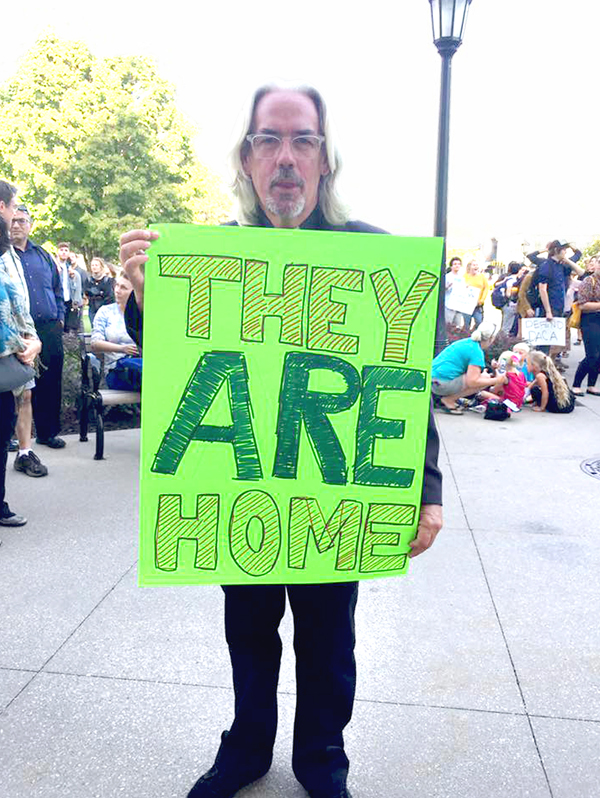By Lindsay Steele
The Catholic Messenger
With the DACA program in limbo, recipients are feeling anxiety. The Diocese of Davenport’s Immigration Office has been flooded with questions from recipients wondering what they should or should not be doing at this time, according to immigration counselor Gricelda Garnica.
It’s become a hot-button topic for the general public, as well.

Father Bernie Weir, pastor of St. James Parish in Washington, attends a DACA rally earlier this month.
DACA, or Deferred Action for Childhood Arrivals, is a program that gives some people who came to the United States without documentation as children an opportunity to live and work in the United States without the risk of deportation for a period of two years, subject to renewal. Deferred action does not provide lawful status, but those who qualify for the program are eligible for work authorization. Only people with a clean record, aside from their undocumented status, are eligible to participate in program.
The program has been in place since 2012 and to date about 787,580 people have been approved for the program, according to government figures.
On Sept. 5, Attorney General Jeff Sessions, on behalf of the Trump administration, announced that DACA would expire in six months’ time unless Congress could enact legislation to save the program. On Twitter, President Donald Trump stated that he will “revisit” DACA if Congress is unable to make a decision by that time.
Garnica said people have been asking if new DACA applications will be granted in this six-month window. U.S. Citizenship and Immigration Services (USCIS) will consider pending requests made by Sept. 5, but they are rejecting all applications for initial requests received after that date.
Regarding renewals, the DACA recipients whose benefits expire between Sept. 5, 2017, and March 5, 2018, must act quickly. At press time, USCIS said it would only process DACA renewal requests received by Oct. 5, 2017, from current beneficiaries whose benefits will expire between these dates.
Despite the recent media attention paid to DACA, Garnica said a lot of people don’t know the details of the DACA program. This includes people who support the continuation of the program.
One misconception is that DACA recipients receive government benefits. Although they must have taxes withheld from their paycheck at the same rate as U.S.-born workers, DACA recipients are not eligible to receive these benefits. This extends to public college tuition rates and government-based financial aid for schooling. DACA recipients who attend college must pay out-of-state tuition and cannot receive public scholarships or aid.
The idea that DACA recipients are “taking peoples’ jobs” is a common objection, Garnica said, but because they are able to work legally under the protections of state and federal minimum wages, subject to tax withdrawal, this is less of a concern than if they were working under the table for lower wages.
Often, people who come to the United States undocumented or have a temporary status that expires will work odd jobs or work for companies that hire undocumented workers for cash. Companies and workers do not pay taxes on this income. Offering people more opportunities to work legally — as DACA does — helps make sure that all workers and companies pay into Social Security, Medicare, etc.
Current and would-be DACA recipients are wondering what their options are if DACA is discontinued, Garnica said.
The news she must deliver is grim — their path to citizenship is extremely limited. Unless a DACA recipient marries a U.S. citizen, has a sibling who is a U.S. citizen or has a U.S. citizen child 21 years of age or older, “there is no line,” Garnica said. A military program which opened itself up to DACA recipients as a potential pathway to citizenship in 2014 has been on hold since last year.
Businesses could petition on an employee’s behalf, such as healthcare entities often do for foreign-born medical professionals, she said. But for the most part, businesses see immigrants “as replaceable as machines,” despite their skill-sets and education levels.
For almost all DACA recipients, their choices would be to continue to live with their families in the United States, without protection, or return to their country of origin. This is a conundrum that many undocumented citizens who grew up before DACA was enacted currently face, she said.
Garnica said DACA recipients can best advocate for the continuation of the program and immigration reform in general by sharing their stories. They can offer a glimpse of how undocumented immigrants can be productive members of society who value education and have career ambitions; Garnica said one local DACA recipient is pursuing his dream of becoming an anesthesiologist.
“By sharing their stories, they can open the eyes of the American people, that (DACA) is good for everyone, that they aren’t criminals,” Garnica said. “Maybe they will better understand.”











